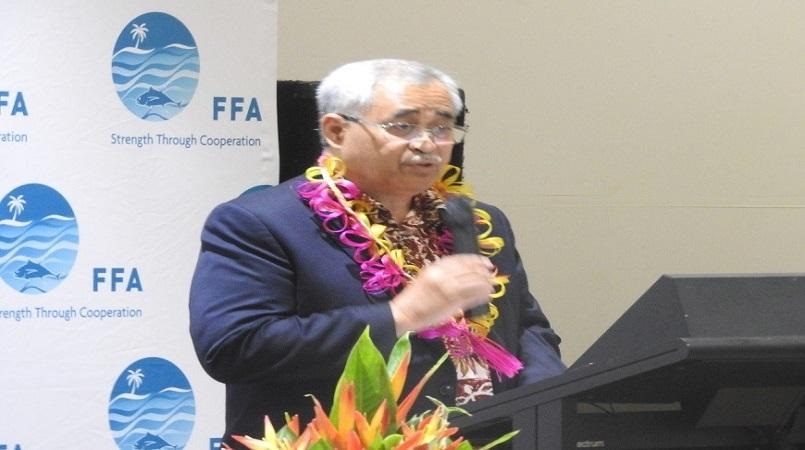
There is a strong possibility that the so called ‘blue boats’ -small Asian fishing boats involved in coastal poaching — have made it into Vanuatu’s waters.
Over the past few years blue boats have been found in Palau, the Federated States of Micronesia, Papua New Guinea and as far south as Australia and New Caledonia.
The director general of the Forum Fisheries Agency James Movick says these vessels, most of which come from Vietnam, are difficult to catch.
“It is a difficult challenge because these are small boats that by and large because they are small and they are not part of the tuna fishing fleet, they are not required to have transponders on board or automatic location communicators, so essentially we have to physically spot these boats in order to be able to apprehend them.”
He said the FFA was now taking steps to put into place a number of surveillance mechanisms that will allow the agency to assist those countries that are being affected by this problem to better surveil their zones and to target these boats.
“So the thing I want to keep is that the blue boats are effectively poaching within your 12-mile zones, they are coming onto the reefs of the countries that are affected. At the present time that’s Palau, FSM, Papua New Guinea, Australia, and New Caledonia where they definitely have been sighted and apprehended.
“We think that because they are getting through to New Caledonia that there is a strong possibility that they are also in the Solomon Islands and Vanuatu. We have to make that assumption for planning purposes,” FFA DG Movick said.
He added that these boats were typically not part of the FFA’s mandate, however, as a regional agency, the agency recognizes that it has a responsibility and there is an opportunity to use the regional platforms to support those countries to better surveillance and monitor any blue boat activity.
“So we are planning to have to bring together those parties that are being affected in the first quarter of next year in order to discuss a strategy. And this will be a strategy that will need the cooperation of some of our larger metropolitan friends and partners we are really going to have to track these boats all the way from the ports from which they originate through the navigational pathways into the region.”
It is going to be difficult as these boats that don’t have transponders, are primarily wooden so they don’t show very well on radar in that they are small and so we are trying to trial the use of a number of different forms of satellite surveillance technology which is very expensive but we nevertheless think that in order to assist the member countries have a handle on this issue.
Most island countries don’t have aeroplanes or the budgets for the planes to go out and look and the planes can only go out so far.
Most of the boats apprehended have Vietnamese citizens on board and many come from Vietnamese ports but Vu Duyen Hai the head of Vietnamese delegation to the Western and Central Pacific Fisheries Commission which met in Nadi, denies Vietnam is responsible.
“Some other countries have informed us that Vietnamese boats also come to other countries like Palau or Micronesia to poach but Vietnam is not so sure that these are Vietnamese vessels.”
He accepted that some fishing vessels stray outside Vietnam’s 200-miles Exclusive Economic Zone but he said this is because they “follow the fish” and most do not have equipment to tell them if they mistakenly enter other countries’ EEZ.
He said the Vietnamese government has tried to advise them not to go to other countries’ EEZ to poach because that would be illegal fishing.
He said the Vietnamese fisheries authorities also check local fishing vessels but “sometimes, fishing vessels go out, switch off their communication equipment and authorities could not locate them and this becomes a problem and now they are also against this and it has very heavy penalties including removal of licenses for ever .”
Vu said the government of Vietnam was very sorry about hearing of the incident of burning of blue boats by Palau, and that the government of Vietnam removed the fishermen’s licenses so they don’t fish again.
“Vietnamese government doesn’t support such activities and have strong penalties and install communications equipment on vessel s to check their locations and they cooperate with countries to including Indonesia, Timor Leste, PNG and Australia to stop these boats.”
Vietnam wants to become member of the WCPFC, but many members of the Forum Fisheries Agency do not want Vietnam to become a full member while this issue continues.
Palau’s Noah Idelchonga senior fisheries advisor to the Palau Minister of Environment who also works with the California-based NGO The Nature Conservatory agrees blue boats present a difficult problem.
It costs Pacific governments a lot to care for stranded seamen while they go through the legal processes which in Palau can lead to having their boats burned.
“It is drastic what has happened by burning the boats, but the government is setting an example,”
“Indonesia is bombing them,” Idelchong said
“That is a little bit too much for us,” he added.
Photo: Director general of the Forum Fisheries Agency James Movick
